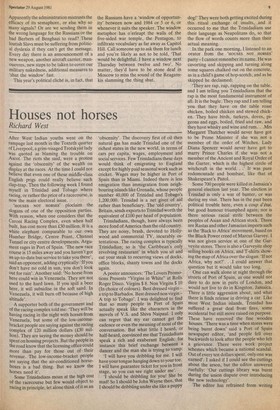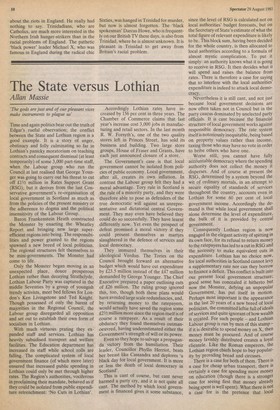Houses not horses
Richard West
After West . Indian youths went on the rampage last month in the Toxteth quarter of Liverpool, a grim-visaged Trotskyist lady was quoted as blaming the trouble on Ascot. The riots she said, were a protest against the 'obscenity' of the wealth on display at the races. At the time I could not believe that even one of these middle-class English prigs could really believe such clap-trap. Then the following week I found myself in Trinidad and Tobago where racing, or rather the price of a racecourse, is now the main electoral issue.
'HOUSES NOT HORSES' ploclaim the Slogans of one of the opposition parties. With reason, when one considers that the Caroni Racing Complex, even when half built, has cost more than £30 million. It is a white elephant comparable to our own Humber Bridge, Centre Point, Channel Tunnel or city centre developments. Argument rages in Port of Spain. 'The new race course is 15 miles away and you haven't got an up-to-date bus service to take you there', said an opponent, adding cryptically: `If you don't have no cold in sun, you don't look out for rain'. Another said: 'No horse from here could win in Venezuela. They are not used to the hard lawn. If you spill a beer here, it will subsidise in the soft sand. In Venezuela, it will burn off because of high altitude'.
A supporter both of the government and of the racing complex told me: 'They will be having racing in the night with horses from Venezuela, but some of the low-incomebracket people are saying against the racing complex of 120 million dollars (£30 million). They are saying the money should be spent on housing projects. But the people in the road know that the licensing office could more than pay for those out of their revenue. The low-income-bracket people are saying that the air-conditioned horseboxes is a bad thing. But we know the horses need it'.
Some Trinidadians moan at the high cost of the racecourse but few would object to racing in principle, let alone think of it as an 'obscenity'. The discovery first of oil then natural gas has made Trinidad one of the richest states in the new world, in terms of cars per capita, wages, employment and social services. Few Trinidadians these days would think of emigrating to England except for highly paid seasonal work such as cricket. Wages may be higher in Port of Spain than in Miami. Indeed there is less emigration than immigration from neighbouring islands like Grenada, whose people number 40,000 of Trinidad and Tobago's 1,200,000. Trinidad is a net giver of aid rather than beneficiary. The 'old country', Britain, sends exports to Trinidad worth the equivalent of £100 per head of population.
Trinidadians, though, have always been more fond of America than the old country. They are noisy, brash, devoted to Hollywood and commercial TV, incurably ostentatious. The racing complex is typically Trinidadian; so is 'the Caribbean's only revolving restaurant' in which you sit and eat your steak to recurring views of docks, office blocks, shanty towns and the docks again.
A poster announces: 'The Lovers Promotions Presents "Virgins in White" at Rolls Roger Disco. Virgins $ 8. Non Virgins $ 10 (In choice of colours). Best dressed virgin — a trip to Barbados. Best dressed non virgin — A trip to Tobago'. I was delighted to find that so many people in Port of Spain actually speak like the characters in the movels of V.S. and Shiva Naipaul. I only can regret that my ear cannot get the cadence or even the meaning of most of the conversation. But what little I heard, or half-heard, convinced me that Trinidadians speak a rich and exuberant English: for instance this brief exchange between a dancer and the man she is trying to vamp: 'I will have you dribbling for me. I will have your tongue hanging down to your toe. I will have guarantee ticket for you in front stage, so you can see right under me'. 'I should be dribbling for you! She be mad! So I should be John Wayne then, that I should be dribbling under she like a puppy dog!' They were both getting excited during this ritual exchange of insults, and it occurred to me that the Trinidadians use their language as Neapolitans do, so that the flow of words counts more than their actual meaning.
In the park one morning, I listened to an orator from the 'HOUSES NOT HORSES' party — I cannot remember its name. He was cavorting and skipping and turning along some squares chalked out on the concrete, as in a child's game of hop-scotch; and as he skipped he declaimed: 'They are rap, rap, rapping on the table, and I am telling you Trinidadians that the rap is the most fundamental instrument of all. It is the bugle. They rap and I am telling you that they have on the table roast chicken, boiled chicken and stewed chicken. They have birds, turkeys, doves, pigeons and eggs, boiled, fried and raw, and they have whisky and wine and rum. . .Mrs Margaret Thatcher would never have got to be Prime Minister if she was not a member of the order of Witches. Lady Diana Spencer would never have got to marry Prince Charles if she was not a member of the Ancient and Royal Order of the Garter, which is the highest circle of witchcraft in the world. . .' It was pure rodomontade and bombast, like that of Shakespeare's Pistol.
Some 700 people were killed in Jamaica's general election last year. The election in Trinidad is only a war of banter, or was during my visit. There has in the past been political trouble here, even a coup d'etat, but good humour triumphed again; nor is there serious racial strife between the peoples of Asian and African stock. There are Rastas and other Jamacian imports such as the 'Back to Africa' movement, based on the Black Power creed of Marcus Garvey. I was not given service at one of the Garveyite stores. There is also a Garveyite shop selling books on Africa, and T-shirts showing the map of Africa over the slogan: 'If not Africa, why not?'. . .I could answer that question but it would take too long.
One can walk alone at night through the streets of Port of Spain, as one would not dare to do now in parts of London, and would not live to do in Kingston, Jamaica. There is little aggression about, and what there is finds release in driving a car. Like most West Indian islands, Trinidad has suffered a great deal from fires, some accidental but still more raised on purpose. These have removed the fine wooden houses. 'There was a time when stores were being burnt down' said a Port of Spain newspaper editor, 'and people fell over backwards to look after the people who felt a grievance. There were work project schemes which became a national scandal. Out of every ten dollars spent, only one was earned'. I asked if I could see the cuttings about the arson, but the editor answered ruefully: 'Our cuttings library was burnt during the union dispute over introducing the new technology'.
The editor has refrained from writing about the riots in England. He really had nothing to say. Trinidadians, who are Catholics, are much more interested in the Northern Irish hunger-strikers than in the racial problems of England. The pathetic 'black power' leader Michael X, who was famous in England during the radical chic Sixties, was hanged in Trinidad for murder, but now is almost forgotten. The 'black spokesman' Darcus Howe, who is frequently on our British TV these days, is also from Trinidad, where he is almost unknown. It is pleasant in Trinidad to get away from Britain's racial problem.



































 Previous page
Previous page